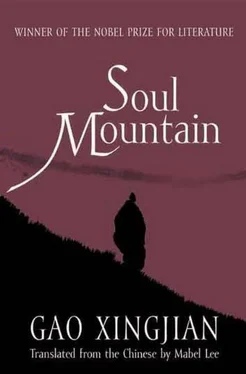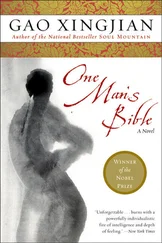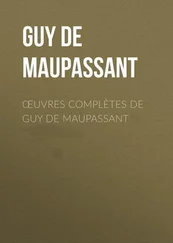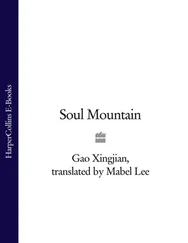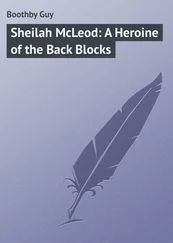When I go back to the highway and see the empty bus by the road, I suddenly realize that there isn’t in fact any rationality in the human world. If I hadn’t got on the bus, wouldn’t I have avoided all this stress? There would have been no driver, no passengers, no ticket inspectors and no fine. But the problem is I still have to find somewhere to spend the night.
I go back to the tea stall and see a fellow passenger is there.
“The damn bus isn’t going,” I say.
“I know,” he says.
“Where are you spending the night?”
“I’m trying to find somewhere.”
“Where have all the passengers gone?” I ask.
He says they’re locals, they always have somewhere to go and time is of little consequence for them, a day earlier or a day later doesn’t matter. However, he has to get to the county town by this evening so that he can go into the mountains early the next morning. He’s been sent by the Guiyang Zoo which had received a telegram from Yinhong county saying the peasants had caught this half-bird-half-fish creature up in the mountains. If he goes any later this creature might die.
“So be it, if it dies,” I say. “Can they fine you?”
“It’s not that,” he says. “You don’t understand.”
I say it’s impossible to understand the world.
He says he’s talking about this half-bird-half-fish creature, not about the world.
I say there’s no great difference between this half-bird-half-fish creature and the world.
He takes out the telegram and shows it to me. It says, “The villagers of this county have caught alive a strange creature that is half bird and half fish. Come as quickly as possible to identify it.” He also says the zoo once got a telegram saying that a forty- or fifty-catty giant salamander had been washed down a mountain stream, but by the time the person despatched arrived the fish not only had died but had been divided up and eaten by the villagers. It was impossible to reconstruct the corpse, so a specimen couldn’t be made. This time he will wait on the highway to see if he can get a lift from a passing vehicle.
I stand with him for quite a while on the highway. A few trucks drive past and time after time he waves the telegram, but no-one takes any notice. It’s not my mission to save this half-bird-half-fish creature or the world, so why am I here eating dust? I may as well go into the restaurant to have something to eat.
I ask the woman who brings out the food if I can stay the night. She seems to think I’m asking her if she’s taking customers and, glaring at me, says, “Can’t you see? This is a restaurant!”
I swear a silent oath to myself that I will not get on that bus again, but there is at least a hundred kilometres to go and it will take at least two days on foot. I go back to the highway, the person from the zoo is no longer there. I wonder if he got a lift.
The sun is about to set and the benches at the tea stall have been taken inside. The pounding of drums comes from below the highway — something must be happening. I look down at the bottom of the slope and before me are the tiled roofs of houses with cobblestoned spaces in between. Further on are layers of paddy fields, the early crop has been harvested and in some of the fields the black soil has been ploughed.
I walk down the slope, following the sound of the drums. A peasant goes by along the embankment with his trouser legs rolled up, his calves covered in mud. A little further on a child is leading a water buffalo on a rope towards a pond near the village. I look at the smoke rising from the chimneys over the rooftops below and a peacefulness rises in my heart.
I stop to listen to the sound of the drums from the village. There is no driver, no inspectors with red armbands, no infuriating bus and no telegram to go as quickly as possible to identify this half-bird-half-fish creature: everything belongs to nature. I think back to those years when I had to work as a peasant in the villages, if things hadn’t changed later on, wouldn’t I still be working in the fields just like them? I would also be up to the calves in mud, after work I wouldn’t bother to wash, and I would no doubt be without my present anxieties. Nothing could be more natural than the evening scene of smoke from chimneys, tiled rooftops, and the near and yet distant sound of drums.
The drumbeats repeat nan-nan na-na over and over and seem to be telling a wordless legend. The colour of the water and the glow of the sky, the blackened rooftops, the pale grey cobblestones vaguely visible in the courtyards between the houses, the soil warmed by the sun, the snorting of water buffaloes, the sound of garrulous talk coming from the houses, the evening breeze, the rustling of the leaves on the trees above, the smell of the paddy hay and the cow sheds, the sound of water swilling, the creaking of a door hinge or a wooden pulley over a well, the chirping of sparrows and the cooing somewhere of a pair of pigeons nesting, the shrill voices of women or children, the feeling of sadness and the chirping of winged insects, the soil underfoot dry and hard on the surface but crumbling and loose underneath, submerged lust and the thirst for happiness, tremors in the mind induced by the sound of the drums, the desire to be barefoot and sitting on a doorsill worn black and shiny by all the people who have sat upon it, all suddenly converge.
The shaman of Tianmenguan has sent someone to the carpenter’s yard to get the old man to make the head of the Goddess Tianluo. The shaman will come in person on the twenty-seventh day of the twelfth month to invite the goddess to receive offerings at his altar. The messenger has brought a live goose as a deposit and the work is to be completed on schedule. The old man will then be given a jar of rice wine and half of a pig’s head which will be plenty to see him through to the New Year. The old man is petrified and realizes that he doesn’t have many days. The Goddess Guanyin rules over the living and the Goddess Tianluo rules over the dead: the goddess is coming to hasten the end of his life.
Over the past few years, apart from the carpentry work, he has made quite a number of carvings. For people’s homes he has made the god of wealth, the laughing arhat, the monk gatherer of vegetarian food, and the honest judge; for the exorcist performance troupe he has carved a whole set of masks: the half-man-half-god Zhang the Clearer of Mountains, the half-man-half-animal horse general, and half-man-half-demon goblins; and for people from outside the mountains he has carved the crooked mouthed Qin boy for them to amuse themselves. He has also carved the Goddess Guanyin but no-one has ever asked him to carve the malevolent Goddess Tianluo who controls people’s fates. The goddess has come to take his life. How could he have been so muddle-headed as to agree? He blames himself for getting too old, for being too greedy. As long as people will pay he carves anything they want. Everyone thinks his carvings are like the real thing, one can tell at a glance it’s the god of wealth, the clever official, the laughing arhat, the monk gatherer of vegetarian food, the honest judge, the impetuous general who clears mountains, the horse general, the goblins, or the Goddess Guanyin. He has never seen the Goddess Guanyin, he only knows she is the goddess who brings sons. A woman came from outside the mountains with two lengths of red cloth and a bundle of incense. She had heard that the rock where the mountain people made offerings to their ancestors was efficacious, so she came to the mountains to pray for a son. When she saw he could make figures of divinities, she asked him to make her a Guanyin and stayed the night in his house. She was up early, very happy, and took with her the Guanyin he’d spent the whole night carving for her. However, he has never made the Goddess Tianluo because no-one has ever asked him and because this malevolent spirit is only worshipped at the altars of shamans. He can’t stop shivering and breaks out in a cold sweat all over: he knows that the Goddess Tianluo has already attached herself to his body and is just waiting to take his life.
Читать дальше
Конец ознакомительного отрывка
Купить книгу
